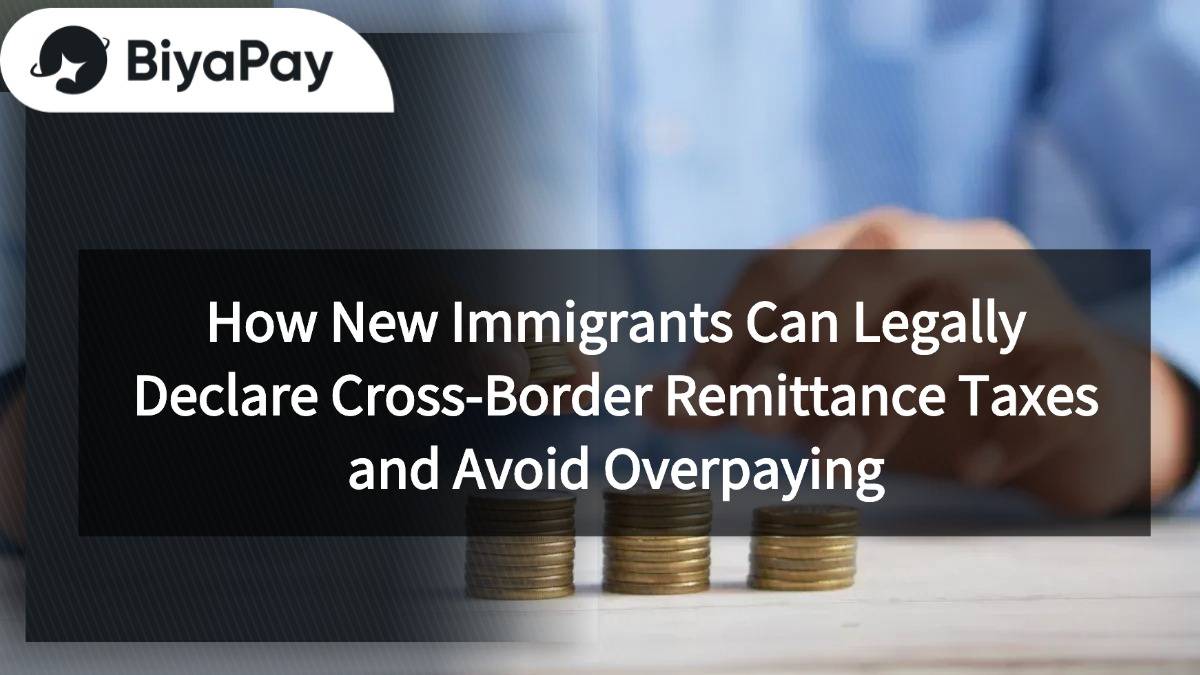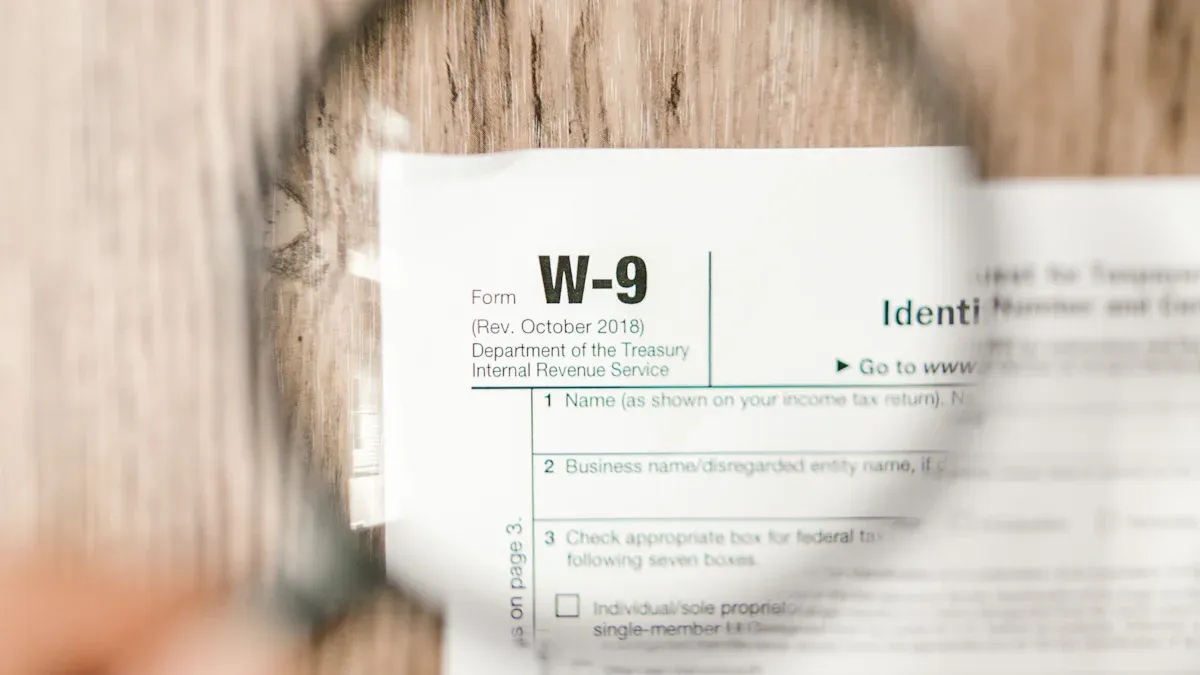- EasyCard
- Trade
- Help
- Announcement
- Academy
- SWIFT Code
- Iban Number
- Referral
- Customer Service
- Blog
- Creator
How New Immigrants Can Legally Declare Cross-Border Remittance Taxes and Avoid Overpaying

Image Source: pexels
As a new immigrant, you may find that cross-border remittances involve complex tax issues. Different countries have strict regulations on cross-border fund flows, and a slight misstep could lead to significant tax burdens or legal risks. Legal declaration is particularly important. By understanding the requirements for declaring immigrant remittances, you can avoid unnecessary trouble while reducing tax costs. Planning remittance amounts and declaration timelines can help you comply with regulations while maximizing personal benefits.
Immigrant Remittance Declaration Requirements

Image Source: pexels
Declaration Thresholds for Remittance Amounts and Related Regulations
When making cross-border remittances, you need to understand the declaration requirements and related regulations for remittance amounts in different countries. The U.S. Internal Revenue Service stipulates that remittances and gifts exceeding certain amounts must be declared. For example, banks will report large remittance information to relevant authorities by filling out FinCEN Form 104, and you need to provide accurate personal information. If you attempt to avoid the $10,000 declaration threshold by making multiple small deposits, banks may view this behavior as suspicious and report it to the IRS. Additionally, the FBAR regulation requires U.S. taxpayers to declare their foreign financial accounts if the total account balance exceeds $10,000, and it must be reported accurately.
In China, the Foreign Exchange Administration Regulations clearly specify the legality and declaration requirements for cross-border remittances and foreign exchange transactions. Cross-border payment or receipt on behalf of others may be considered disguised foreign exchange trading or illegal arbitrage, which could constitute a violation. Therefore, understanding and complying with these regulations is key to avoiding legal risks.
| Regulation Name | Main Content | Scope of Impact |
|---|---|---|
| Electronic Funds Transfer Act (EFTA) | Defines “remittance transfer,” including transfers to overseas via banks. | Expected to impact over 40 million people, including green card holders and various non-immigrant visa holders. |
| Section 36C | Allows U.S. citizens to apply for income tax credits, requiring SSN and related proof. | Applies to U.S. taxpayers applying for credits. |
| Section 6050BB | Requires RTPs to submit three types of information reports, with penalties for non-compliance. | Involves all qualified RTPs and their clients. |
Impact of CRS Information Exchange on Cross-Border Remittances
The CRS (Common Reporting Standard) information exchange mechanism has significantly increased tax transparency.
Through this mechanism, tax authorities in various countries can access basic financial data of overseas accounts. This means your cross-border remittances and overseas income will be more easily identified by tax authorities. The implementation of CRS has reduced the concealment of cross-border remittances while increasing the pressure for tax compliance. Tax authorities can indirectly grasp your overseas income through cross-border payment data and fund flow records. Therefore, you need to ensure the accuracy of all remittance and income declarations to avoid unnecessary tax issues.
Recommendations for Retaining Remittance Records and Bank Statements
Retaining complete remittance records and bank statements is an important step in ensuring tax compliance.
You can manage these records through the following methods:
- Regularly download and save bank statements, especially those related to cross-border remittances.
- When using services from international banks like Hong Kong banks, ensure you obtain detailed transaction records.
- Archive all related documents by category, including remittance receipts, contracts, and tax returns.
These records not only help you provide accurate information during tax declarations but also serve as strong evidence in case of tax authority audits. Good record-keeping habits will significantly reduce tax risks.
Key Points for Overseas Asset Declaration
Legal Requirements and Timelines for Overseas Asset Declaration
Overseas asset declaration requires compliance with multiple laws and regulations and must be completed within specified timelines. According to the Statistics Law and its implementation rules, Chinese individual residents must truthfully declare overseas assets and liabilities. These regulations cover personal foreign exchange transactions, overseas investments, anti-money laundering laws, and individual income tax laws. Failure to declare on time may result in fines or other legal consequences.
Below are some important international regulations and their implementation years:
| Law Name | Implementation Year | Main Content |
|---|---|---|
| Exxon-Florio Amendment | 1988 | Grants CFIUS authority to prohibit transactions for national security reasons. |
| Foreign Investment and National Security Act | 2007 | Expands CFIUS jurisdiction and enhances congressional oversight. |
| Foreign Investment Risk Review Modernization Act | 2018 | Introduces mandatory declaration systems and expands review scope. |
You need to plan declaration timelines based on these regulatory requirements to avoid additional risks due to delays.
Importance of Consistency in Asset Valuation and Declaration
When declaring overseas assets, the accuracy of asset valuation is crucial. Discrepancies between declared amounts and actual asset values may trigger tax authority audits. To ensure consistency, you can take the following measures:
- Regularly conduct professional asset valuations to obtain authoritative asset value reports.
- Retain all related documents, including valuation reports, transaction records, and bank statements.
- When using services from international banks like Hong Kong banks, ensure you obtain detailed account information.
Accurate asset valuation not only helps you stay legally compliant but also avoids tax issues arising from data inconsistencies.
Potential Legal and Tax Risks of Concealing Assets
Concealing overseas assets can lead to serious legal and tax consequences.
According to Article 63, Paragraph 1 of the Tax Collection and Administration Law, tax authorities have the right to recover unpaid or underpaid taxes and impose fines, which can be up to five times the unpaid tax amount. For example, a company in Qingdao was fined $55,697.17 for issuing false VAT invoices, and a building materials business in Nanning, Guangxi, was fined $110,000 for similar violations.
Concealing assets may also affect your credit record and even lead to criminal liability. To avoid these risks, you need to truthfully declare all overseas assets and retain complete declaration records.
Tip: Legal declaration is not only a requirement for complying with the law but also an important means of protecting personal property and credit.
Effective Strategies for Legal Tax Avoidance
Reasonably Planning Family Income and Welfare Applications
By reasonably planning family income, you can effectively reduce your tax burden while enjoying more social welfare benefits. Family income allocation needs to be adjusted based on the tax status and income levels of family members. For example, if a family member belongs to a low-tax-rate group, you can transfer part of the income to their name to reduce the overall tax rate.
Additionally, when applying for welfare, you need to ensure the accuracy of income declarations. Many countries’ welfare policies are directly tied to family income. If income is too high, you may lose eligibility; if income is too low, it may attract tax authority scrutiny.
You can optimize family income planning through the following methods:
- Diversify Income Sources: Allocate income to different accounts of family members.
- Utilize Tax-Free Allowances: Ensure each family member fully utilizes their tax-free allowance.
- Record All Income: Retain payslips, bank statements, and other documents for verification.
Reasonable planning not only helps you legally avoid taxes but also ensures your family receives the benefits it deserves.
Leveraging Tax Incentives (e.g., Gift Tax)
Tax incentive policies are important tools for legal tax avoidance. Many countries offer tax-free allowances for gift taxes, allowing you to transfer assets to family or relatives without incurring tax liabilities. For example, the U.S. allows individuals to gift a certain amount of assets annually without paying gift tax. You can use this policy to transfer part of your assets to family members in lower tax brackets.
Below is a real-world case demonstrating the successful application of tax incentive policies:
- A multinational company established a subsidiary in Qatar, focusing on software development.
- Through tax planning, it transferred part of its R&D activities to a low-tax country.
- Enjoyed a corporate income tax exemption policy in Qatar.
- Utilized bilateral tax treaties to avoid double taxation, ultimately achieving significant financial benefits.
This case shows that reasonably leveraging tax incentive policies can yield substantial economic benefits. You can consult professional tax advisors to understand applicable incentive policies and develop corresponding tax avoidance strategies.
Avoiding Conflicts Between High Consumption and Low Income
Conflicts between high consumption and low income can easily attract tax authority attention.
If your consumption level far exceeds your declared income, tax authorities may suspect you are concealing income.
Therefore, you need to ensure consumption records align with income declarations.
Below are some suggestions to avoid conflicts:
- Record Consumption Details: Retain invoices and receipts for all significant expenditures.
- Plan Consumption Reasonably: Avoid large expenditures in a short period.
- Declare True Income: Ensure all income is truthfully declared to avoid triggering unnecessary audits.
Through these measures, you can reduce tax risks while maintaining a good credit record.
Tip: The core of legal tax avoidance lies in planning and compliance. By reasonably planning family income, leveraging tax incentive policies, and avoiding conflicts between consumption and income, you can maximize personal and family financial benefits while staying compliant with the law.
Tax Risks and Audit Responses

Image Source: pexels
Key Areas of Focus for Canada Revenue Agency Audits
The Canada Revenue Agency (CRA) conducts strict audits of cross-border remittances and overseas assets.
You need to pay special attention to the following key areas:
- Undeclared Overseas Income: The CRA can access your overseas account information through international information exchange mechanisms. If you fail to declare this income, you may face fines or be required to pay back taxes.
- Large Remittance Records: The CRA focuses on large remittances, especially those that do not match declared income.
- Family Income Allocation: If income allocation among family members is unreasonable, it may trigger tax authority audits.
Understanding these key areas can help you prepare in advance and avoid unnecessary tax risks.
How to Prepare Remittance and Income Proof for Audits
Preparing thorough remittance and income proof is critical for responding to tax audits.
Below are some practical suggestions:
- Retain Remittance Records: Ensure all cross-border remittance receipts and bank statements are complete. When using services from international banks like Hong Kong banks, obtain detailed transaction records.
- Income Proof Documents: Retain payslips, contracts, and tax returns. These documents can prove the legality and authenticity of your income sources.
- Organize Documents by Category: Archive all related documents by year and type for easy access.
These preparations not only help you respond to CRA audits but also improve your tax declaration efficiency.
Tax Filing Considerations for Dual Tax Residency
If you hold tax residency in two countries, you need to pay special attention to the following when filing taxes:
- Avoid Duplicate Declarations: Under bilateral tax treaties, you can apply for tax credits to avoid paying duplicate taxes due to dual residency.
- Determine Primary Tax Residency: Identify your primary tax residency and declare income based on that country’s tax regulations.
- Declare All Income: Regardless of the country of origin, all income must be truthfully declared to avoid legal risks from concealment.
Dual tax residency may increase the complexity of tax filing, but through reasonable planning and compliant declarations, you can effectively reduce your tax burden.
Tip: Understanding immigrant remittance declaration requirements and preparing related documents in advance are important steps to reduce tax risks.
The core of legal declaration and tax avoidance lies in compliance, transparency, and planning. These principles not only help you comply with tax regulations but also significantly reduce your tax burden.
Through the following methods, you can tangibly experience the advantages of these principles:
- Information technology enhances tax governance capabilities, reducing declaration errors.
- Simplified tax processes lower time and cost for tax filing.
- Improved tax authority efficiency while increasing taxpayer satisfaction.
Seeking assistance from professional tax advisors is particularly important. They can provide personalized tax planning to help you reduce your tax burden long-term and protect financial security.
FAQ
1. Do Cross-Border Remittances Require Tax Payments?
Whether cross-border remittances require tax payments depends on the nature and amount of the remittance. If the remittance involves income or gifts, it may need to be declared and subject to related taxes. You need to confirm specific requirements based on local tax regulations.
2. How to Avoid Tax Authority Audits Due to Incomplete Remittance Records?
Retaining complete remittance records is crucial. You can regularly download bank statements, especially those related to cross-border transactions. Organize and back up documents by category to ensure proof is readily available.
Tip: When using services from international banks like Hong Kong banks, obtaining detailed transaction records helps reduce tax risks.
3. Will CRS Information Exchange Affect My Tax Declarations?
The CRS information exchange mechanism makes it easier for tax authorities to access your overseas account information. You need to ensure all income and assets are truthfully declared to avoid audits due to information discrepancies.
4. What Are the Consequences of Concealing Overseas Assets?
Concealing overseas assets may lead to fines, back taxes, or even criminal liability. Tax authorities may recover undeclared taxes and impose significant penalties. You need to truthfully declare all assets to avoid legal risks.
5. How to Use Gift Tax Policies for Legal Tax Avoidance?
Gift tax policies allow you to transfer assets to family or relatives without tax liability. You can consult tax advisors to understand applicable tax-free allowances and develop reasonable gifting plans.
Note: Legal tax avoidance requires compliance with tax regulations while ensuring declaration accuracy.
New immigrants often face high fees, complex tax filings, and legal risks in cross-border transfers. BiyaPay offers a compliant, cost-effective solution! Exchange over 30 fiat currencies and 200+ cryptocurrencies with transparent real-time rates, and benefit from transfer fees as low as 0.5% across 190+ countries, with same-day initiated, same-day delivered transfers. Sign up for BiyaPay in just one minute to access seamless, compliant remittances and US/HK stock investments without complex offshore accounts. Plus, grow idle funds with a 5.48% annualized yield on flexible savings. Secured by U.S. MSB and SEC licenses and blockchain technology, BiyaPay ensures trust and safety. Start now—join BiyaPay to simplify tax compliance, optimize savings, and unlock efficient global financial opportunities!
*This article is provided for general information purposes and does not constitute legal, tax or other professional advice from BiyaPay or its subsidiaries and its affiliates, and it is not intended as a substitute for obtaining advice from a financial advisor or any other professional.
We make no representations, warranties or warranties, express or implied, as to the accuracy, completeness or timeliness of the contents of this publication.




Contact Us
Company and Team
BiyaPay Products
Customer Services
is a broker-dealer registered with the U.S. Securities and Exchange Commission (SEC) (No.: 802-127417), member of the Financial Industry Regulatory Authority (FINRA) (CRD: 325027), member of the Securities Investor Protection Corporation (SIPC), and regulated by FINRA and SEC.
registered with the US Financial Crimes Enforcement Network (FinCEN), as a Money Services Business (MSB), registration number: 31000218637349, and regulated by FinCEN.
registered as Financial Service Provider (FSP number: FSP1007221) in New Zealand, and is a member of the Financial Dispute Resolution Scheme, a New Zealand independent dispute resolution service provider.




















